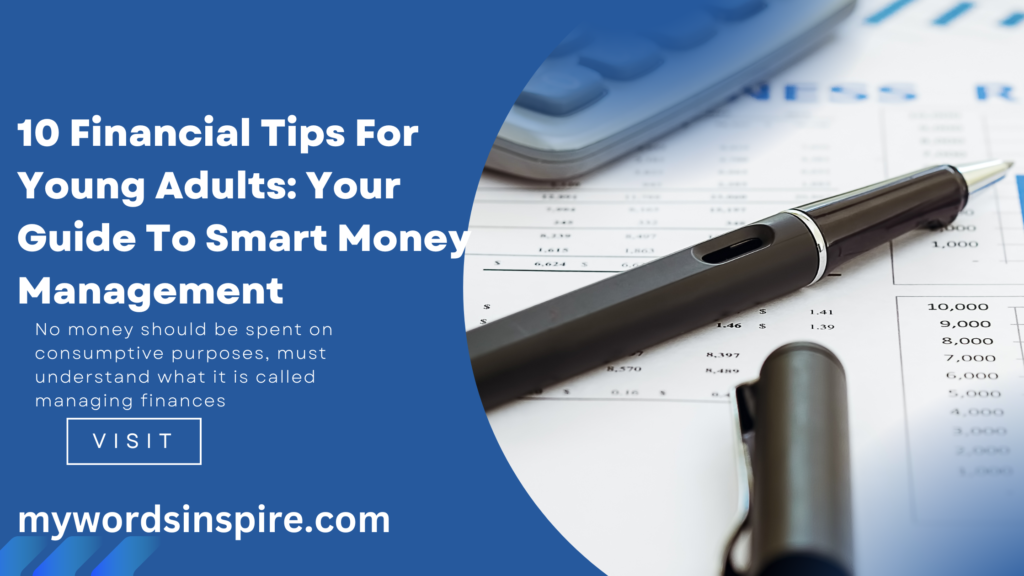
Essential financial tips for young adults to build a secure future budgeting, saving, investing, and managing debt wisely.
In today’s fast-paced world, financial literacy is more essential than ever, especially for young adults embarking on their journey toward financial independence.
Mastering personal finance skills early can set a solid foundation for financial security and success.
This guide will take you through the top 10 financial tips to help young adults manage their money smartly, make informed decisions, and avoid common financial pitfalls.

1. Set Clear Financial Goals
One of the first steps to mastering your finances is to set clear, achievable financial goals. Whether saving for a car, planning for a dream vacation, or building an emergency fund, having specific goals can keep you motivated and focused.
Start by defining short-term (1–3 years), mid-term (3–5 years), and long-term (5+ years) financial goals. Use the SMART (Specific, Measurable, Achievable, Relevant, and Time-bound) method to ensure each goal is realistic and reachable.
Why Setting Goals Matters
Setting financial goals helps you prioritize your spending and saves you from unnecessary expenses. By keeping your targets in sight, you can create a financial plan that aligns with your aspirations and lifestyle.
2. Create a Budget and Stick to It
Budgeting is a cornerstone of personal finance. It involves tracking your income, expenses, and savings to ensure you’re living within your means. Start by calculating your monthly income (after taxes), listing your fixed expenses (like rent and bills), and estimating variable expenses (like entertainment and dining out).
Many young adults use the 50/30/20 rule: allocate 50% of your income to necessities, 30% to discretionary spending, and 20% to savings and debt repayment.
Budgeting Tools for Beginners
Consider using budgeting apps like Mint, YNAB (You Need a Budget), or PocketGuard. These apps can help you track expenses, set savings goals, and receive reminders, making budgeting easier and more accessible.
3. Start Building an Emergency Fund
Life can be unpredictable, so building an emergency fund is crucial for young adults. This fund acts as a financial cushion during unexpected expenses, such as medical emergencies, car repairs, or job loss. Financial experts recommend saving at least three to six months’ worth of living expenses in an easily accessible account, like a high-yield savings account.
How to Build Your Emergency Fund
Start small by setting aside a portion of each paycheck. Automatic transfers to your savings account can make this easier. Over time, increase the amount as your income grows to reach your target.
4. Manage and Pay Off Debt
Many young adults carry debt, especially student loans and credit card debt. While debt is common, managing it wisely is key to maintaining financial health. Begin by listing all your debts, including the interest rates and minimum payments. Focus on paying off high-interest debt first, as it accumulates quickly, potentially causing financial strain.
Strategies for Debt Repayment
Two popular debt repayment methods are the Avalanche Method (paying off high-interest debt first) and the Snowball Method (paying off the smallest debt first). Choose a method that aligns with your goals, budget, and motivational needs.
5. Develop Healthy Credit Habits
Building good credit early can open doors to better financial opportunities, such as securing lower interest rates on loans or renting an apartment. To build and maintain good credit, pay your bills on time, keep credit utilization low (ideally below 30%), and avoid opening multiple credit accounts within a short period.
Monitoring Your Credit Score
Use free credit monitoring tools like Credit Karma or Experian to track your credit score and receive updates on any changes. Regularly checking your score can help you spot issues early and address them promptly.
6. Start Investing Early
Investing is one of the most effective ways to build wealth over time. Thanks to compound interest, even small contributions can grow significantly if invested over a long period. Start by contributing to your employer’s retirement plan, such as a 401(k), especially if they offer a matching contribution. Alternatively, open an Individual Retirement Account (IRA) or consider a low-cost brokerage account for additional investments.
Beginner-Friendly Investment Options
Young adults new to investing can explore options like Robo-advisors (e.g., Betterment or Wealthfront), index funds, or ETFs (Exchange-Traded Funds) that provide diversification and reduce risk. Always prioritize investments that align with your risk tolerance and financial goals.
7. Learn the Basics of Taxes
Understanding taxes can save you money and prevent financial stress during tax season. Familiarize yourself with common tax deductions and credits, as they can significantly lower your taxable income. If you’re employed, check your W-4 form to ensure the correct amount of taxes is being withheld. Freelancers and gig workers should set aside funds for quarterly tax payments.
Tax Preparation Resources
For tax filing, consider free resources like IRS Free File for simple returns or low-cost software such as TurboTax and H&R Block. Additionally, the IRS website offers guides and tools for tax preparation assistance.
8. Protect Yourself with Insurance
Insurance is a critical part of financial planning, as it protects your assets and prevents significant out-of-pocket expenses in emergencies. Young adults should prioritize health insurance, even if they’re generally healthy. Renters insurance, auto insurance, and possibly life insurance are also worth considering, especially if you have dependents or valuable assets.
Types of Insurance to Consider
If employed, check with your employer for health and life insurance options. Additionally, independent insurance comparison tools like Policygenius or The Zebra can help you compare policies and find coverage that suits your needs.
9. Develop Smart Spending Habits
Practicing mindful spending can improve your financial well-being. Track your expenses to identify spending habits and look for areas to cut back if necessary. Avoid impulsive purchases and consider implementing a 30-day rule: if you see something you want, wait 30 days before deciding to buy it. This cooling-off period helps avoid unnecessary expenses and ensures your spending aligns with your goals.
Tips for Mindful Spending
Focus on purchasing quality over quantity, as durable products save money in the long run. Using cashback and rewards credit cards wisely can also save money on essential expenses, but ensure balances are paid in full each month.
10. Continue Your Financial Education
Financial literacy is an ongoing journey. By continuously learning, you can keep up with changing financial landscapes and make better-informed decisions. Read books, take online courses, and follow personal finance blogs to expand your knowledge. Many resources cover diverse topics, from investing strategies to budgeting tips, to enhance your financial skills.
Recommended Resources for Financial Education
Books like “Rich Dad Poor Dad” by Robert Kiyosaki and “The Total Money Makeover” by Dave Ramsey offer valuable insights for young adults. Websites like NerdWallet, Investopedia, and The Financial Diet provide tips, calculators, and articles tailored to financial beginners.
FAQs About Financial Tips for Young Adults
Question: How much should young adults save monthly?
Answer: Ideally, save 20% of your income, but if that’s challenging, start small. Consistency matters more than the initial amount, as you can always increase your savings over time.
Question: Is it too early to start investing?
Answer: No, the earlier you start investing, the more time your money has to grow. Even small investments can lead to substantial growth over the years due to compound interest.
Question: Which is better, a 401(k) or IRA?
Answer: Both are excellent retirement accounts, but they serve different purposes. A 401(k) is employer-sponsored and may offer matching, while an IRA is individually managed with more flexibility in investment choices. Consider using both if possible.
Conclusion
Financial planning doesn’t need to be overwhelming.Young adults can build a solid foundation for a financially secure future. Starting with small steps today can make a big difference tomorrow. Financial success is not about how much you earn but how well you manage and grow what you have.






